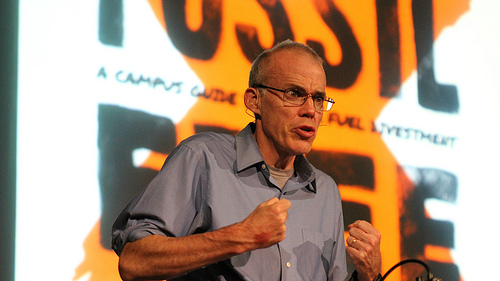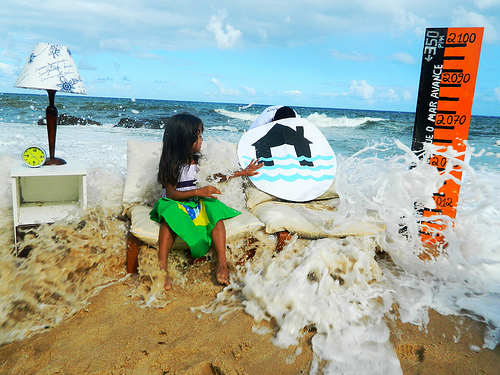
This first thing that comes to mind when I think of Bill McKibben, author of Eaarth, Deep Economy, and Enough, and founder of the climate activist organization 350.org, is a line from his 1989 book The End of Nature, a passage on climate change that is particularly affecting and un-wonky: “We have changed the atmosphere, and thus we are changing the weather. By changing the weather, we make every spot on earth man-made and artificial. We have deprived nature of its independence, and that is fatal to its meaning. Nature’s independence is its meaning; without it there is nothing but us.” Nothing but us. Logical, elegant, and more chilling than any graph.
A confession: I hate thinking about climate change. It makes me feel at once guilty and powerless. It seems inevitable. It fills me with dread. But dread gets us nowhere, so I’m particularly interested in people who are able to look this slow cataclysm in the eye, which is what Bill McKibben does every day. His work as an author and activist is to spur people into collective action, from protesting hydrofracking to divesting from fossil fuel companies. As we end a year in which we broke all kinds of records for warm and weird weather comes to an end, I asked McKibben about atmospheric science, staving off despair, and what he thinks the future holds.
—Rachel Riederer for Guernica
Guernica: Your organization 350.org gets its name from the level of CO2 in the atmosphere that we need to return to in order to stabilize the climate, 350 parts per million (down from the current 392 ppm). If we don’t return to 350 ppm, what kind of consequences can we expect to see, or is it possible to make this kind of prediction?
Bill McKibben: Returning to 350 isn’t going to happen in my lifetime, sadly, even if we do everything right. The question now is how far past it we’re going to go. At the moment we’re nearing 400 ppm CO2 in the atmosphere, and scientists are saying on our current path we’ll raise the temperature of the earth 4 or 5 degrees Celsius this century, which is not remotely comparable to anything that’s happened before in human history. To give you a little sense of scale, so far we’ve raised the temperature 1 degree Celsius, and that’s been enough to melt the Arctic. As NASA’s James Hansen said this year, we’re in a “planetary emergency,” our first.
Guernica: We hear a lot a lot about how climate change enables extreme weather events like Hurricane Sandy, but for laypeople, this connection can be pretty opaque. Can you describe some of the mechanisms by which atmospheric carbon translates to weirder, more dangerous weather?
Bill McKibben: Quick fact to remember: Warm air holds more water vapor than cold. The atmosphere, on average, is 5 percent wetter than it was forty years ago, a staggering change in a basic physical parameter, and perhaps the clearest sign that we’ve left behind the Holocene, that 10,000 year period of benign climatic stability that underwrote the rise of civilization. That much more moisture loads the dice for both drought in arid areas and downpours in wet ones—it helps fuel huge storms. Everything amps up as you add more of the sun’s energy to our narrow envelope of atmosphere. Think about Sandy: it featured the lowest barometric pressure ever recorded north of Cape Hatteras, and the widest windfield we’ve ever seen: at its height, tropical storm force winds stretched 1,040 miles across. And a few weeks later Super typhoon Bopha killed even more people across Palau and Mindanao—it was the most southerly typhoon ever recorded. We break weird records like that every week now.
It’s the greatest fight in human history, one whose outcome will reverberate for geologic time, and it has to happen right now.
Guernica: You’ve recently started a nation-wide campaign in which college students lobby their school administrations to divest from fossil fuel. How’s it going? Have you found that college students are especially motivated to do this kind of activism?
Bill McKibben: It’s going beyond our wildest expectations. In six weeks we’re up to 182 campuses with active divestment fights. Kids are motivated because a) it’s the biggest moral question of our time and b) they have to live on this planet another 60 years, so they have a stronger practical interest than those of us already on the downward slide. I think it’s the most exciting moment yet in the climate fight.
Guernica: I think that many of us, when we think about our carbon footprints, think mostly about driving—I know that I was surprised to learn that eating meat is incredibly carbon-intensive. Apart from driving less, what can we do?
Bill McKibben: Organize. You’re not going to solve climate change by yourself. Get together with other people someplace like 3350.org or gofossilfree.org and push for structural change now. Push as hard as you can. And if you have some energy left over, change your lightbulb and cook yourself an excellent tofu dinner!
Guernica: Barbara Kingsolver’s new novel Flight Behavior imagines what happens when the monarch butterfly flock, basically the entire species, becomes so disoriented by climate change and habitat loss that they ends up wintering in Tennessee instead of Mexico. There are some activist-types in the book who the narrator calls “the 350 guys.” What did you think about your organization making the leap into fiction?
Bill McKibben: I think Barbara Kingsolver is about the finest novelist we’ve got, and a great active supporter of good causes too. You know you’re making an impact when the antennae of our most perceptive cultural observers twitch!
Guernica: My last question is a little more personal. It seems to me that the more you know about climate change, the more hopeless the situation looks. What do you say to people who might want to bury their head in the sand? This is a long way of asking: knowing what you know about the atmosphere, how do you keep from total despair?
Bill McKibben: That’s where the fighting comes in. It is despairing if you can’t figure out a way to take it on commensurate with the scale of the problem. But we can take it on—it’s the greatest fight in human history, one whose outcome will reverberate for geologic time, and it has to happen right now. We’ve got a very few years to break the power of the fossil fuel industry and help the planet chart a new course. So, that’s worth getting up for every morning!
Bill McKibben is Schumann Distinguished Scholar at Middlebury College, founder of the global climate campaign 350.org, a TomDispatch regular, and the author, most recently, of Eaarth: Making a Life on a Tough New Planet.

Caleb Daniloff: Russia, Cradle of My Dead Worlds
Meaghan Winter: Extinction is the Rule
Joel Kovel and Quincy Saul: Apocalypse and Revelation Are the Same Word
